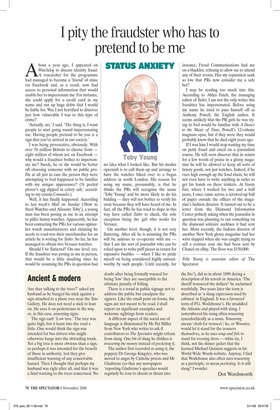Ancient & modern
‘Are they talking to the trees?’ asked my husband as he banged his stick against a sign attached to a plane tree near the Tate Gallery. He does not need a stick to lean on. He uses it on pedestrians in the way, or, in this case, annoying signs.
The sign said: ‘Low tree.’ The tree was quite high, but it leant into the road a little. One would think the sign was intended for bus drivers who might otherwise barge into the obtruding trunk. Yet a big tree is more obvious than a sign, so perhaps it was intended for the benefit of those in authority, lest they give insufficient warning of any conceivable hazard. Then I thought that perhaps my husband was right after all, and that it was a final warning to the trees concerned. No doubt after being formally warned for being ‘low’ they are susceptible to the ultimate penalty of felling.
There is a trend in public signage not to address the public but exculpate the signers. Like the small print on forms, the signs are not meant to be read. I shall report on significant examples and welcome sightings from readers.
A different aspect of the social use of language is illuminated by Mr Pat Miller from New York who writes to ask if contributors to The Spectator might refrain from slang. One bit of slang he dislikes is trousering the money instead of pocketing it.
The author first recorded as using it, the peppery Dr George Kingsley, who was moved to anger by Catholic priests and Mr Gladstone (so that any newspapers ‘reporting Gladstone’s speeches would regularly be torn to shreds or thrust into the fire’), did so in about 1890 during a description of his travels in America. ‘The sheriff trousered the dollars!’ he exclaimed wrathfully. Two years later the term is described as ‘a slang expression used by cabmen’ in England. It was a favoured term of P.G. Wodehouse’s. He straddled the Atlantic and played with slang. I remembered his using often trousering synecdochically as a noun. Trousering means ‘cloth for trousers’; he, or Wooster, would let it stand for the trousers themselves, as he uses soup and fish to stand for evening dress — white tie, I think, not the dinner jacket that the learned Michael Quinion suggests in his World Wide Words website. Anyway, I find that Wodehouse also often uses trousering as a participle, to mean pocketing. Is it still slang? I wonder.
Dot Wordsworth


















































































 Previous page
Previous page